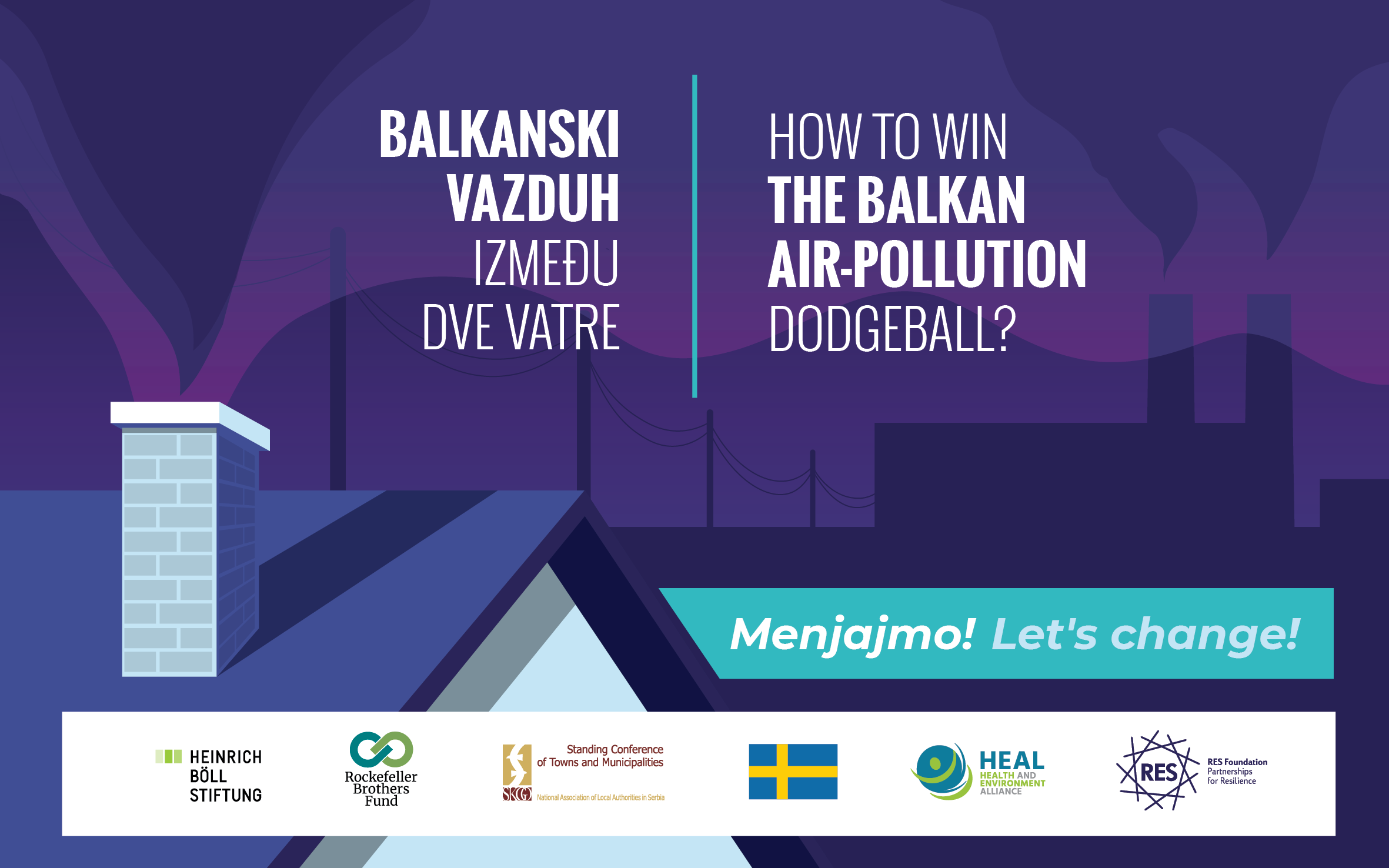ABOUT THE CONFERENCE
Five years ago, we decided to turn our dissatisfaction with air pollution into action that could further improve air quality.
We started with what we knew best and what was troubling us the most – energy poverty. The energy poverty affects all those people who, for various reasons, consume more time and resources to produce less heat and more pollution in their homes and their immediate environment.
Back then, we summed up what we understood as the three most important points:
LET’S MEASURE – air quality
LET’S MEASURE – efficiency of stoves and furnaces
LET’S MEASURE – energy poverty levels
Air quality monitoring standard by Serbian Environmental Protection Agency was at its lowest level. In 2016, the availability of valid hourly values from air quality measuring stations of the national network was 23%, only to decline to 22% in the following year. Air quality programmes were barely used, while civil monitoring was non-existent.
When we raised the question of energy-efficient stoves and furnaces in public, people were very reluctant to tackle it.

Today, five years later, our society understands these points better.
Last winter, the discussions about air quality and achievements in this field reached our gyms, beauty salons, coffee shops and restaurants. This winter, there will be a discussion about stoves and furnaces, as well.
It’s time for a change. We have no excuse to put this issue aside furthermore. We have to immediately start preparing everything we need to welcome the next heating season with a ready programme to reduce pollution from stoves and furnaces so that in the 2022/2023 season we have visible results in improving air quality. Let’s change.
Reckless controlled-field burning is not a necessity, but a choice that owners make in a given socio-economic situation. Let’s change the criteria they consider when making a decision.
Lignite-fired power plants generate significant air pollution. The costs of reducing this kind of pollution without changing the fuel being used are very high and do not eliminate the negative impact on climate change. It’s time for a change.
“We already know what it means, but we simply can’t afford it.”
Some people got the know-how and managed to convince decision-makers to take their responsibilities, which resulted in decreased pollution. Their responsibility as visionaries is to trigger the change. We – taxpayers and consumers, will eventually be the ones to pay for the change, but this change will bring benefit to all of us in the long run.
We’ll learn from those who know better at the online conference “How to win the Balkan air-pollution dodgeball?”, organised by the RES Foundation, on 1-2 December 2021.
LET’S CHANGE – air quality
LET’S CHANGE – efficiency of stoves and furnaces
LET’S CHANGE – energy poverty levels
AGENDA
Thursday, 3 December 2020 (9.30-15.30)
“TEAM HOUSEHOLDS”: How to replace inefficient cooking and heating devices?
OPENING SPEECHES (9.30-10.00)
Françoise Jacob, UN Resident Coordinator in Serbia
Dr. Ellen Überschär, President, Heinrich-Böll-Stiftung
Đorđe Staničić, Secretary general, Standing Conference of Towns and Municipalities
Stephen Ndegwa, Country Manager for Serbia, World Bank
Matej Gasperič, Senior air quality expert, IPA-funded project “EU for better environment”
SESSION 1: SHOW ME THE MONEY (10.00-11.30)
Moderator:
Damjan Rehm Bogunović, Programme Associate, UNEP
Speakers:
Naser Nuredini, Minister of Environment and Physical Planning, Republic of North Macedonia
Larry Brockman, Team Leader, Burn Wise Education Program, US EPA
Marta Cvetkova, Head of Planning and Programming Department, DG “Operational programme environment”, Ministry of Environment and Water, Republic of Bulgaria
Elvis Hadžikadić, Project manager, Green economic development, Energy and Environment Sector, UNDP, Bosnia and Herzegovina
BREAK (11.30-11.40)
SESSION 2: MORE SERVICES, MORE REPLACEMENTS (11.40-13.00)
Moderator:
Aleksandar Macura, Co-founder and Programme director, RES Foundation
Speakers:
Ivana Stevanović Ristić, Sales manager, Alfa plam
Marko Blagojević, Director, Public Investment Management Office, Government of Serbia
Žarko Petrović, Programme Analyst, Resilient Development, UNDP
Dr. Sarath Guttikunda, World bank
Sameer Akbar, Senior Environmental Specialist, World Bank
Dochka Velkova, Expert, LIFE-IP Clean Air project, Republic of Bulgaria
BREAK (13.00-14.00)
SESSION 3: THE BIG PICTURE (14.00-15.30)
Moderator:
Tanja Popovicki, Programme manager, RES Foundation
Speakers:
Bojan Bogdanović, Fund Manager, EBRD ReDEWeB
Oliver Rapf, Executive Director, BPIE
Aleksandra Miletić, Project Officer, UN Women Serbia
Branislava Matić, Head of Department of Environmental Health and School Hygiene, Institute of Public Health of Serbia
Aleksandar Macura, Co-founder and Programme director, RES Foundation
CLOSURE OF THE DAY 1 (15.30)
Friday, 4 December 2020 (9.30-13.30)
“TEAM ELECTRICITY”: When do we phase out coal?
INTRODUCTION: SUPPORT FOR COAL REGIONS IN TRANSITION (9.30-9.50)
Speakers:
Jasmina Trhulj, Head of electricity unit, Energy Community Secretariat
Anna Sobczak, Policy Coordinator for EU Coal Regions in transition, Just Transition Fund in the context of EU Green Deal, Directorate-General for Energy, European Commission
SESSION 1: CHANGE OF TRACK (9.50-11.45)
Moderator:
Aleksandar Macura, Co-founder and Programme director, RES Foundation
Speakers:
Vlatka Matković, Senior Health and Energy Officer, Health and Environment Alliance (HEAL) (+case study, Tuzla)
Aleksandar Kovačević, Senior Visiting Research Fellow, Oxford Institute for Energy Studies
Maja Turković, Expert for electro-energy systems and economics of renewable energy sources, co-founder of Association for Sustainable Development (ASOR)
Christian Redl, Senior Associate, European Energy Cooperation, Agora Energiewende
Michael Stenley, Lead Oil and Gas Specialist, World Bank
BREAK (11.45-12.00)
SESSION 2: DECENTRALISATION (12.00-13.30)
Moderator:
Tanja Popovicki, Programme manager, RES Foundation
Speakers:
Miloš Kostić, Coordinator, CEEFOR
Sandra Vlašić, Co-founder, Terra Hub and member of the President’s Council for Energy Transition, Republic of Croatia
Zorica Korać, Environment Portfolio Manager
Saša Vasilić, Deputy Mayor at Priboj Municipality, Serbia
Dušan Jović, E3 International

